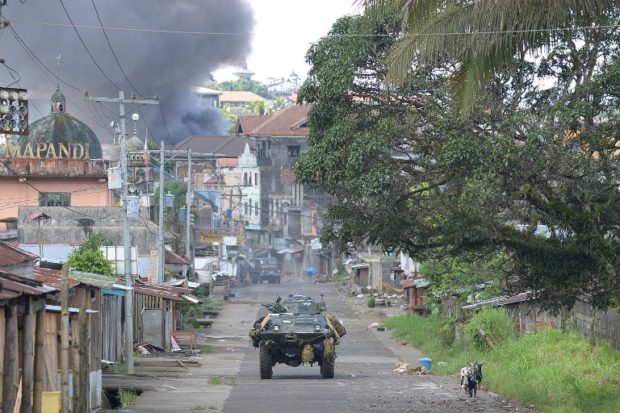Two months after Islamist militants launched an assault on one of the biggest cities in Mindanao, the fighting is dragging on, 114 soldiers have been killed and President Rodrigo Duterte says he is prepared to wait for a year for it to end.
The defense top brass admits it underestimated its enemy and is struggling to finish off the highly organized, pro-Islamic State (IS) fighters who swept through Marawi City on May 23 and have held parts of it despite sustained ground attacks by hundreds of soldiers and daily pummeling by planes and artillery.
On Saturday, lawmakers approved Mr. Duterte’s request to extend martial law to the end of the year on the island of Mindanao, granting greater powers to security forces to go after extremists with a reach that goes far beyond Marawi.
But it remains unclear how exactly Mr. Duterte plans to tackle Islamist extremism after troops retake Marawi, where about 70 militants remain holed up in the debris of what was once a flourishing commercial district, along with many civilian hostages.
More than 500 people have been killed, including 45 civilians and 114 government troops. Nine soldiers were killed, while 49 others were wounded in Friday’s battles, according to Lt. Gen. Carlito Galvez, chief of the Western Mindanao Command.
After missing several self-imposed deadlines to retake the city, the military says its options are limited because of the hostages.
Mr. Duterte said he had asked the military to avoid more civilian casualties.
“I told them ‘do not attack.’ What’s important is we do not want to kill people,” he said on Friday. “If we have to wait there for one year, let us wait for one year.”
The intensity of the battle in Marawi and the presence of foreign fighters fighting alongside local militants has raised concerns that the region may be becoming a Southeast Asian hub for the IS as it loses ground in Iraq and Syria.
Defense Secretary Delfin Lorenzana indicated on Saturday that after Marawi, the government would strengthen surveillance in the region, widening the net to detect rebel training camps and movements of militants.
Security experts say the government needs a strategic overhaul after failing to act on warnings long ago that radical ideology was taking hold in Mindanao, and luring foreign fighters unable to join the Islamic State in Syria and Iraq.
“Things have changed dramatically … our country must pursue some paradigm shifts,” said Rodolfo Mendoza, an analyst and retired police intelligence officer.
“We have to counter the spread of terrorism not only by supporting use of intelligence or counterintelligence, but tackling the root causes,” Mendoza added.
The Marawi assault was planned and executed by a relatively new group, Daulat Ul Islamiyah, better known as the Maute group, which wants recognition from the IS as its regional affiliate.
The Marawi fighting has been much publicized across militant networks and experts say it could attract more fighters to the region.
“It has inspired young extremists from around the region to want to join,” the Institute for Policy Analysis of Conflict said in a report on Friday, adding the fighting had “lifted the prestige of the Filipino fighters in the eyes of IS Central.”
Richard Javad Heydarian, a political science professor at De La Salle University, said Mr. Duterte, who came to power a year ago, channeled security resources into a war on drugs instead of countering Islamist radicalization in Mindanao, an issue the President himself has flagged in the past.
“They were all aware of this. It was just a matter of time,” Heydarian said. —With reports from Richel V. Umel and the wires
